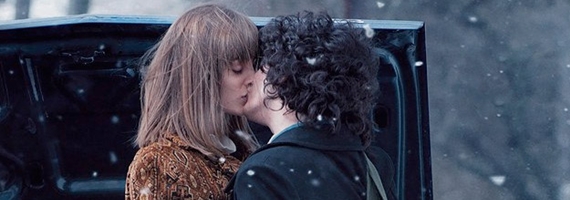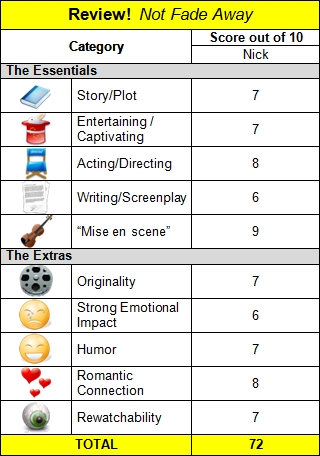
Not Fade Away (2012) Directed by David Chase. Starring: John Magaro, Jack Huston and Will Brill. IMDB says: “Set in suburban New Jersey the 1960s, a group of friends form a rock band and try to make it big.”
“You look like you just got off the boat!”
Not Fade Away is not a bad film, it just misses its mark. It misses its mark because it’s able to craft a coming of age tale about a character, and several side characters, that you just don’t care enough about. The story is about a boy, Douglas, who starts a band with his friends during the 1960’s. His passion for music causes him to skip/drop-out of college and continue his education through his music. But drama unfolds when the band hits rough patches and when Doug vies for the affections of a girl; Grace. The relationship he has with his family doesn’t make matters easier as he grows up and decides what he really wants out of life. Now, if you’ve ever been in a band or tried to win the affections of a girl through your band, or maybe you’re one of our older readers who lived through the 60’s and 70’s as a teen, than maybe you’ll find these characters and their decisions relatable. For me, the emotional investment wasn’t there so when it was time for the dramatic side of things, nothing moved me.
I’ll blame it on the writing before I blame it on the acting. The cast, and their performances, are pretty solid, especially coming from James Gandolfini (Doug’s father), John Magaro (Douglas), Bella Heathcote (Grace), and an almost unrecognizable Jack Huston (Eugene) who is quickly becoming one of my favorite actors. The film looked great, most of it was set in suburban Jersey, and was able to capture the feel of the 60’s pretty well through its soundtrack (lot of blues and Rolling Stones), 60’s magazines and television programs, and it’s overall feel. Most 60’s films are either cramming “free love” down your throat, the Civil Rights Movement, the Vietnam War, the Kennedy Assassination, or the evolution of the arts. Now while this film has a heavy focus on the musical and artistic side of things, it doesn’t get too preachy when it comes to the idea of “Free Love” and the Summer of 69, the Civil Rights Movement, or even the Vietnam War. They’re not used as plot devices to add or take something away from the story, they’re merely conversational pieces used to move minor exposition along or just to remind you, “Hey! It’s the 60’s! Cool huh?” and I really appreciated that because, in my eyes, when a film gets too nostalgic, it can drown the film out leaving you with a bad taste. The film never gets too predictable as writer/director David Chase keeps it feeling fresh and new, but unfortunately, the story and dialogue feel off balance at times. I wouldn’t rush to theaters to see the film, but it is a solid rental or VOD when it’s released.



